Related Research Articles

The Carter Family was a traditional American folk music group that recorded between 1927 and 1956. Their music had a profound influence on bluegrass, country, Southern Gospel, pop and rock music, as well as on the U.S. folk revival of the 1960s.
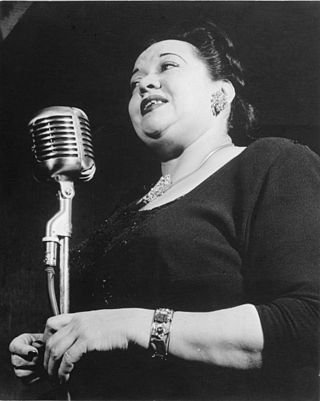
Mildred Bailey was a Native American jazz singer during the 1930s, known as "The Queen of Swing", "The Rockin' Chair Lady" and "Mrs. Swing". She recorded the songs "For Sentimental Reasons", "It's So Peaceful in the Country", "Doin' The Uptown Lowdown", "Trust in Me", "Where Are You?", "I Let a Song Go Out of My Heart", "Small Fry", "Please Be Kind", "Darn That Dream", "Rockin' Chair", "Blame It on My Last Affair", and "Says My Heart". She had three records that reached number one on the popular charts.
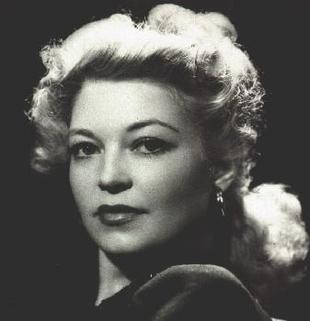
Cindy Walker was an American songwriter, as well as a country music singer and dancer. She wrote many popular and enduring songs recorded by many artists.

XET-AM, nicknamed La T Grande, is a commercial AM radio station on 990 kHz at Monterrey, Nuevo León, Mexico. It is part of Multimedios Radio's Monterrey station cluster. The transmitter is located in San Nicolás de los Garza, near Monterrey.
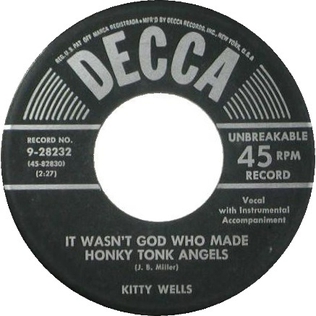
"It Wasn't God Who Made Honky Tonk Angels" is a 1952 country song written by J. D. "Jay" Miller, and recorded by Kitty Wells. It was an answer song to the Hank Thompson hit "The Wild Side of Life." First performed by Al Montgomery as "Did God Make Honky Tonk Angels" on the Feature label which was owned by songwriter J.D. Miller.
"Have I Told You Lately That I Love You?" is a popular song written by Scotty Wiseman for the 1944 musical film, Sing, Neighbor, Sing and performed by Lulu Belle and Scotty. It was their greatest hit and one of the first country music songs to attract major attention in the pop music field. Although the song was featured in the movie, it was not released by Lulu Belle and Scotty until 1947. The first released version of this song was by Gene Autry in 1945.
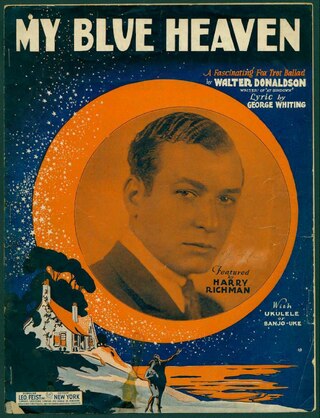
"My Blue Heaven" is a popular song written by Walter Donaldson with lyrics by George A. Whiting. The song was used in the Ziegfeld Follies of 1927. It has become part of various fake book collections. Its musical composition entered the public domain on January 1, 2023.
Shine is a popular song with lyrics by Cecil Mack and Tin Pan Alley songwriter Lew Brown and music by Ford Dabney. It was published in 1910 by the Gotham-Attucks Music Publishing Company and used by Aida Overton Walker in His Honor the Barber, an African-American road show. According to Perry Bradford, himself a songster and publisher, the song was written about an actual man named Shine who was with George Walker when they were badly beaten during the New York City race riot of 1900.

"My Buddy" is a popular song with music written by Walter Donaldson, and lyrics by Gus Kahn. The song was published in 1922 and early popular versions were by Henry Burr (1922), Ernest Hare (1923) and Ben Bernie.

"Meet Me Tonight in Dreamland" was one of the most famous and beloved popular songs of the early 20th century. This gentle waltz, with lyrics by Beth Slater Whitson and music by Leo Friedman, was published in Chicago in 1909.
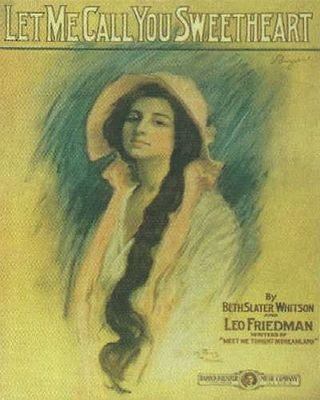
"Let Me Call You Sweetheart" is a popular song, with music by Leo Friedman and lyrics by Beth Slater Whitson. The song was published in 1910 and was a huge hit for the Peerless Quartet in 1911. A recording by Arthur Clough was very popular the same year too. A 1924 recording identifies a Spanish title, "Déjame llamarte mía".
"It's a Good Day" is a popular song written by Peggy Lee and her first husband Dave Barbour and published in 1946. Peggy Lee's recording reached the Billboard charts in January, 1947 peaking at No. 16.
"I've Got The World on a String" is a 1932 popular jazz song composed by Harold Arlen, with lyrics written by Ted Koehler. It was written for the twenty-first edition of the Cotton Club series which opened on October 23, 1932, the first of the Cotton Club Parades.

"Darling Nelly Gray" is a 19th century anti-slavery ballad written and composed by Benjamin Hanby in 1856. It is written as from the point of view of an African-American male slave in Kentucky whose sweetheart has been taken away by slave-owners. The man mourns his beloved, who has been sold South to Georgia. He eventually dies and joins her in heaven. The song became popular in the years preceding the Civil War and helped promote support for the abolitionist cause.

"Nobody's Sweetheart", also known as "Nobody's Sweetheart Now" and "You're Nobody's Sweetheart Now", is a popular song, written in 1924, with music by Billy Meyers and Elmer Schoebel, and lyrics by Gus Kahn and Ernie Erdman. The song is a jazz and pop standard.
"What's New?" is a 1939 popular song composed by Bob Haggart, with lyrics by Johnny Burke. It was originally an instrumental tune titled "I'm Free" by Haggart in 1938, when Haggart was a member of Bob Crosby and His Orchestra. The tune was written with a trumpet solo, meant to showcase the talents of band-mate Billy Butterfield. Crosby's orchestra recorded "I'm Free" the same day it was written.
"Walking the Floor Over You" is a country music song written by Ernest Tubb, recorded on April 26, 1941 in Fort Worth, Texas, and released in the United States that year.
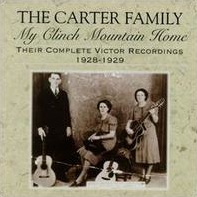
My Clinch Mountain Home: Their Complete Victor Recordings (1928–1929) is a compilation of recordings made by American country music group the Carter Family, released in 1993. It is the second of nine compilations released by Rounder Records of the group's Victor recordings.
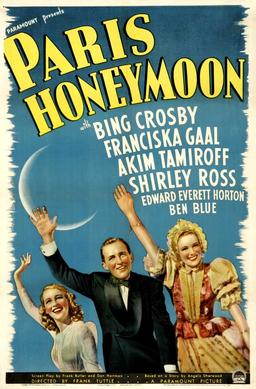
Paris Honeymoon is a 1939 American musical film directed by Frank Tuttle and written by Frank Butler and Don Hartman. The film stars Bing Crosby, Franciska Gaal, Akim Tamiroff, Shirley Ross, Edward Everett Horton and Ben Blue. Filming took place in Hollywood from May 23 to July 1938 and the film was released on January 27, 1939, by Paramount Pictures.

This is a discography of the Carter Family—Sara Carter, her husband A.P. Carter, and their sister-in-law Maybelle Carter—often cited as "the most influential group in country music history":
References
- ↑ "secondhandsongs.com". secondhandsongs.com. Retrieved October 29, 2021.
- ↑ Whitburn, Joel (1986). Joel Whitburn's Pop Memories 1890-1954. Menomonee Falls, Wisconsin: Record Research Inc. p. 78. ISBN 0-89820-083-0.
- ↑ "A Bing Crosby Discography". BING magazine. International Club Crosby. Retrieved October 29, 2021.
- ↑ discogs.com, I'm Thinking Tonight of My Blue Eyes
- ↑ americanhistory I'm Thinking Tonight of My Blue Eyes
- ↑ communityguitar.com I'm Thinking Tonight Of My Blue Eyes
- ↑ Mazor: Barry Mazor, Ralph Peer and the Making of Popular Roots Music, Chicago Review Press, 2015
- ↑ The Urban Experience and Folk Tradition, American Folklore Society/University of Texas Press, 1971
- ↑ Will You Miss Me When I'm Gone: The Carter Family & Their Legacy in American Music, Simon & Schuster, 2002
- ↑ Sara Carter (1898–1979), Contributed by Kip Lornell and the Dictionary of Virginia Biography